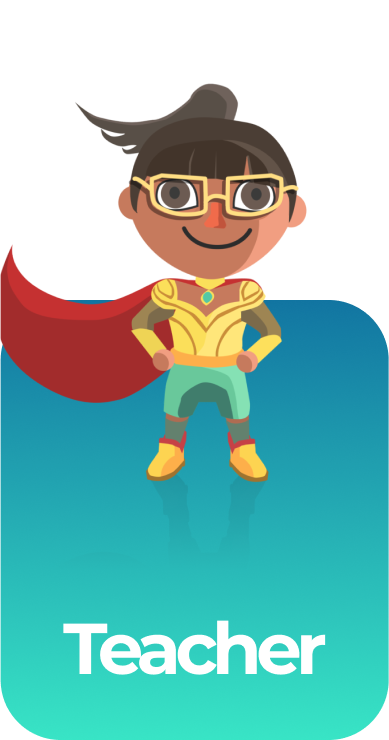In today’s classrooms, adaptive technology is transforming how students learn and engage with Math and Science.
By personalizing instruction to meet individual learning needs, these tools provide a targeted approach to mastery. But what makes adaptive technology effective for K-8 learners?
Let’s explore the key qualities that make a difference in Math and Science instruction, and how Legends of Learning embodies these principles.
Research-Based Progressions
Research in both math and science confirms that learning progresses with dependencies on precursor concepts.
For example, it’s difficult for a student to solve a problem about adding fractions without understanding what a fraction is. Therefore the definition of a fraction and its parts occurs before adding fractions conceptually or fluently occurs.
If a student struggles to learn even with more than one approach, the problem is possibly that they don’t understand an earlier concept and that is preventing their continued learning.
Legends of Learning addresses this by plotting learning progressions that take into account connections between learning objectives.
As learners attempt challenges, they are offered support when they struggle, first a review of the content, then work on pre-requisite skills that may need mastery to enable success on the initial challenge.
Progression Models in Math
Progression models play a critical role in adaptive learning, ensuring students build on foundational knowledge before advancing to more complex concepts.
Research shows that personalized progression paths enhance student outcomes by allowing them to master foundational topics before tackling more advanced material.
This approach has been validated by numerous studies highlighting how sequential mastery contributes to long-term retention and higher performance in mathematics.
The What Works Clearinghouse has several documents that establish the power of mathematics progressions including works by Kilpatrick, Sarayma, and Clements.
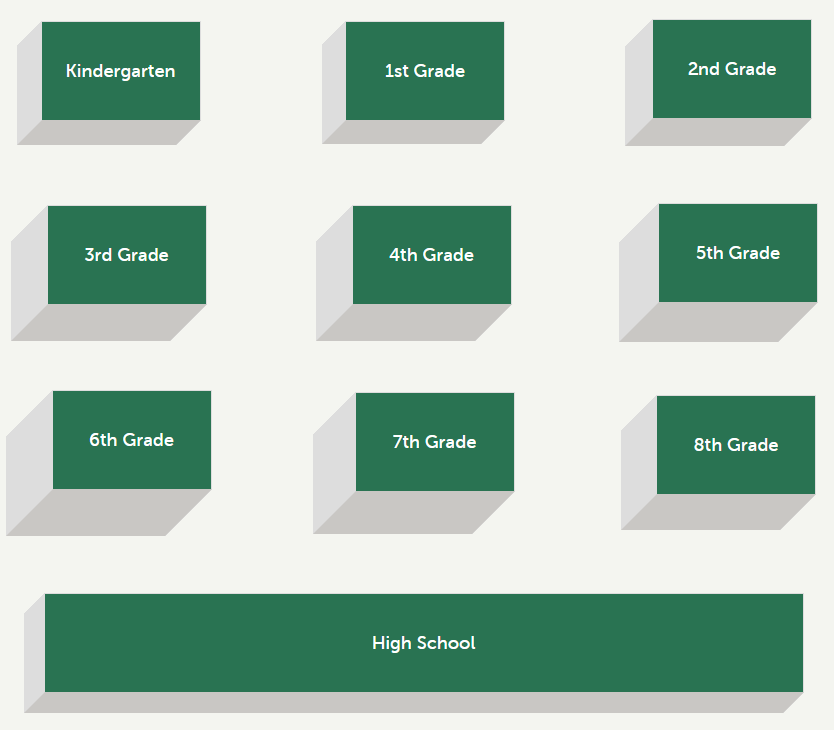
State and National Standards depend on connections between objectives like these mapped by Achieve the Core.
LoL structured learning progressions within mathematical domains, allowing students to study connected concepts for efficient and effective progress.
Progression Models in Science
In science education, progression models are equally important, as described by the National Research Council and other scholars.
Science is inherently sequential, with each concept building on prior knowledge. Studies often cite the importance of this progression in achieving a deeper understanding and practical application. (Corcoran, Mosher, Rogat, 2009)
Legends of Learning aligns with this by structuring science content into domains like biology, chemistry, and physics. This ensures that students move through topics in a logical sequence, supporting long-term retention of scientific concepts.
Placement and Adaptive Algorithms
Research supports the effectiveness of adaptive algorithms in personalizing learning experiences and improving student outcomes by dynamically adjusting instruction to meet student needs. (Faber, Luyten & Visscher, 2017) Classrooms are becoming increasingly academically diverse, making each student’s experience in school unique.
Adaptive instruction, or modifying the content and presentation of material, promotes a deeper transfer of learning.
Research shows students who receive adaptive instruction demonstrate significantly greater gains in mathematics than those who receive nonadaptive methods of instruction (Aleven, et al., 2017).
Once students are placed, Legends of Learning’s system adapts their progression based on performance, keeping them in their zone of proximal development (Vygotsky, 1978) (Vygotsky, 1978), where they are challenged but not overwhelmed.
A unique feature of the Legends of Learning system is that in addition to other inputs for movement throughout progressions, students have a choice over what they do next.
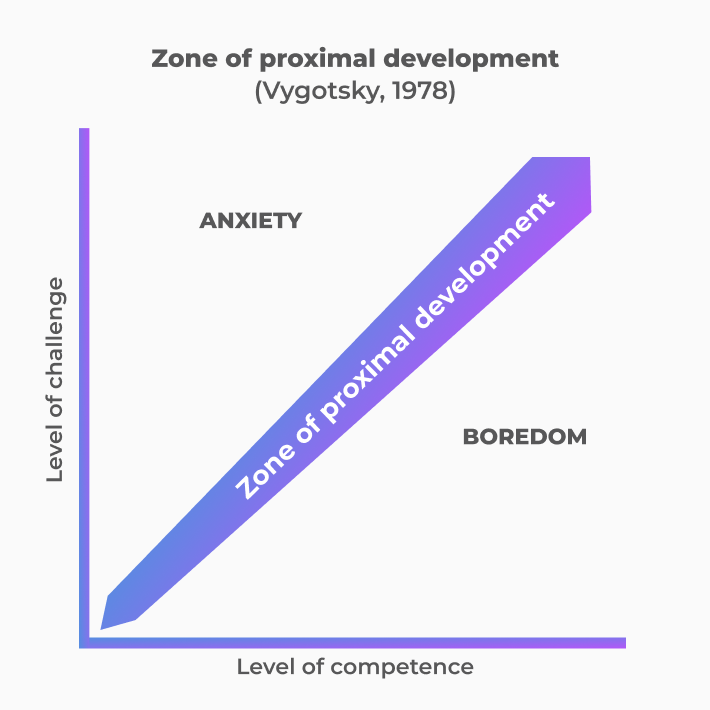
As students move through content in Legends of Learning, if they struggle, they receive options to get additional instruction on the content or they may choose to review a precursor to build a foundation for the new learning.

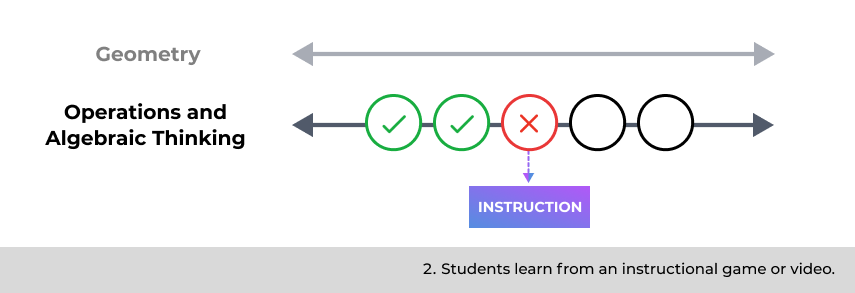

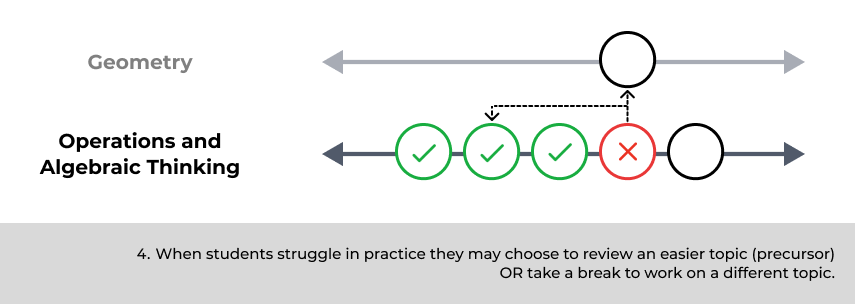
Instruction and Assessment of Mastery or Need for Intervention
Research consistently emphasizes the importance of timely intervention and ongoing assessment in adaptive learning environments.
Platforms that monitor student performance and provide just-in-time interventions result in better educational outcomes than those relying solely on traditional assessments.
Legends of Learning’s system tracks student performance in real time, awarding star levels based on mastery.
When students struggle, the platform automatically offers resources such as mini-games, video lessons, or foundational topics.
Instructional Assignment and Student Agency
Student agency—the ability to make choices about one’s learning—is increasingly recognized as a key factor in engagement and academic success.
Students who make choices have more investment in their own learning, and progress follows. “By offering…choices, you provide students with opportunities to assume responsibility for regulating their own learning and to experience a sense of self-determination as they do so.” (Brophy, 2004) The USDoE includes student agency as part of their definition of personalized learning.
Not every choice should be offered, it’s important that the choices match student readiness and need. “A qualification on providing students with choices is that the number and variety of choices available need to be calibrated to the student’s current readiness to choose sensibly.” (Schwartz, 2000).
Legends of Learning offers students the autonomy to explore new topics or revisit foundational concepts at their discretion, while teachers retain control over the learning path through assignments and focus areas.
When a student struggles in the program, the adaptive algorithm allows students to choose to learn more about the topic through a minigame or video, work on a precursor topic to improve their foundations for learning, or choose another topic to take a break.
This balance between structured instruction and student choice has been shown to improve motivation and deepen learning. Mastery is still required, so students continue to progress through learning content.
Context and Teacher Intention for Instructional Goals
A key challenge for adaptive learning technologies is aligning with teacher-directed learning goals. Teachers often highlight the need for these platforms to complement, rather than replace, traditional classroom instruction.
Legends of Learning addresses this by allowing teachers to assign focus areas based on curriculum goals while also offering the option to adapt the student’s learning path in response to their performance.
This alignment with instructional intentions helps teachers stay in control while providing the opportunity to benefit from personalized, adaptive technology.
In addition, teachers may assign any resource on the LoL platform to specifically align with whole class or small group instruction.
Engagement in Adaptive Technologies
The very best placement and adaptivity won’t work if learners don’t like or pay attention to the activities.
Many research studies verify that gamification and other forms of engagement increase time on task and performance.
“Digital games are able to engage learners on an effective, behavioral, cognitive, and sociocultural level in ways few other learning environments are able to.” (Plass, Homer & Kinzer, 2015).
Legends of Learning embeds learning in thousands of digital games that users report engage learners. There are educational games that instruct learners as they play.
There are also a variety of practice games where data about students’ understanding is gathered. These games are developed by hundreds of different game studios to provide a diversity of experiences that further engage learners.
“Students that typically do not participate in class or finish their work will finish the Legends of Learning lessons every time, it is a game-changer for those students in learning material in my class and for me as an instructor. I use Legends of Learning as a reward for finishing all their work for the week so they can have fun and learn more deeply about the material.” – Middle School Science Teacher, Seymour Middle School, TX
Conclusions
- Adaptive technology is reshaping education, offering a tailored approach that meets students where they are and helps them succeed.
- Legends of Learning stands out as a uniquely engaging platform that embodies these qualities, providing research-based progressions, dynamic algorithms, and tools that foster both student agency and teacher control.
- With its focus on mastery and alignment with classroom goals, Legends of Learning is a powerful resource for K-8 Math and Science instruction.
References
Aleven, V., McLaughlin, E. A., Glenn, R. A., & Koedinger, K. R. (2017). Instruction based on adaptive learning technologies. In R. E. Mayer & P. Alexander (Eds.), Handbook of research on learning and instruction (2nd ed., pp. 522-560). New York: Routledge.
Brophy, J. (2004). Motivating Students to Learn, 2nd edition, Jere Brophy, Lawrence Erlbaum Associates, Publishers, Mahwah, NJ.
Clements, D. H., & Sarama, J. (2024). Systematic review of learning trajectories in early mathematics. ZDM – Mathematics Education.
Corcoran, T., Mosher, F.A., Rogat, A. (2009). Learning Progressions in Science: an evidence-based approach to reform. Center on Continuous Instructional Improvement Teachers College–Columbia University.
Faber, J. M., Luyten, H., & Visscher, A. J. (2017). The effects of a digital formative assessment tool on mathematics achievement and student motivation: Results of a randomized experiment. Computers & Education, 106, 83–96.
Kilpatrick, J., Swafford, J., and Findell, B. (2001). Adding It Up: helping children learn mathematics, National Academy Press.
Plass, J. L., Homer, B. D., & Kinzer, C. K. (2015). Foundations of game-based learning. Educational Psychologist, 50(4), 258–283.
Schwartz, B. (2000). Self-determination: The tyranny of freedom. American Psychologist, 55, 79-88.
Vygotski, L.S. (1978). Mind in Society: the development of higher psychological processes, Harvard University Press.
Are you new to Legends of Learning and eager to try these games? Sign up now and embark on an educational adventure!
Have questions? Reach out to us at support@legendsoflearning.com
Don’t miss out on our latest posts!
- Classroom Tips to Navigate the Holiday Season with Calm and Confidence
- Next Level Learning: How Florida Teachers Are Implementing Game-Based Science Instruction
- Game-Based Learning Aims to Level Up Student Engagement in Florida Science Classrooms
- Sleigh the Season with New Math Games This November
- Discover November’s Cool New Science Games

